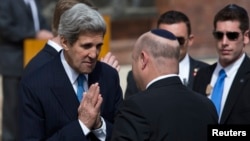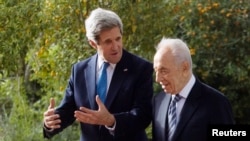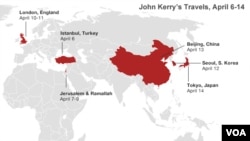U.S. Secretary of State John Kerry says he is trying to restart Israeli-Palestinian peace talks by discussing possible steps the two sides can take to ease the deep mistrust between them.
Speaking Monday to reporters traveling with his delegation in Jerusalem, Kerry said he is "convinced" the United States and the parties can "break down" that mistrust. But he said he will not try to rush the process by setting an "external time limit."
The top U.S. diplomat said he is "intensely focused" on the Israeli-Palestinian conflict, describing it as a "festering absence of peace [that] groups everywhere [use] to recruit and encourage extremism." But he said he will keep his strategy "quiet" to have the "best chance of trying to get something moving."
Palestinian officials said Kerry has suggested modifying a 2002 Arab peace plan to better address Israeli concerns about borders and security. Israel has rejected the plan's key requirement for a full Israeli withdrawal from land captured in the 1967 war in return for full peace with Arab nations.
Palestinian President Mahmoud Abbas traveled to the Qatari capital, Doha, Monday to discuss the status of the Arab peace plan with members of a special Arab League committee.
A senior U.S. State Department official said Kerry supports "enhancing" the role of the Arab initiative, but he did not elaborate.
Kerry discussed his ideas with Palestinian Prime Minister Salam Fayyad at the U.S. consulate in Jerusalem on Monday, and later made brief remarks to the media while meeting with Israeli President Shimon Peres.
"I would say to everybody, I have no illusions about difficulties, we have seen them. But you have to believe in the possibilities in order to get there, and you and I believe in them and I am convinced there is a road ahead," he said.
Kerry also was due to have dinner with Israel's Prime Minister Benjamin Netanyahu before holding more talks with the Israeli leader Tuesday.
Robert Wexler, president of the Washington-based Center for Middle East Peace, said Secretary Kerry's peace strategy is not limited to diplomatic contacts with Israelis and Palestinians.
"Secretary Kerry is working closely with many of the foreign ministers of the Arab League, talking about how they might - not amend the Arab peace initiative, but implement in a way so as to create greater incentives for Israel to move forward. These could, in certain ways, provide even greater confidence building measures to both the Israelis and Palestinians than some of the things the parties themselves could do," he said.
Wexler, a former U.S. congressman, said there are numerous positive steps that Arab nations could take, such as enabling Israeli passenger planes to fly over their territory, opening trade links with Israel, and accepting invitations to meet with Israeli officials.
Israel and Abbas' Palestinian Authority have not held peace talks since short-lived negotiations in September 2010.
Palestinian President Mahmoud Abbas has said he will not negotiate with Israel until it agrees to stop settlement activity on land he claims for a state, and base the borders of that state on the 1967 cease-fire lines. Mr. Netanyahu has rejected preconditions to negotiations.
Former U.S. ambassador to Egypt Daniel Kurtzer said peace talks are not likely to resume if either side sets preconditions.
"I think what Secretary Kerry is trying to do right now is to see how much common ground he might be able to build between the opening positions of the two sides. And then he would consider - I'm not sure he's made this decision yet - putting forward American terms of reference or American parameters that the two sides don't necessarily have to agree with, but they would agree to come to negotiations using them to the extent possible as a means of getting the talks started," he said.
Kurtzer, a professor of Middle East policy studies at Princeton University, said he doubts that Kerry will devote much attention to pressing Israelis and Palestinians to make incremental "confidence building" steps toward peace talks.
He said President Barack Obama's former Mideast envoy George Mitchell spent a lot of time on that approach with "very little payoff."
Earlier Monday, Kerry took part in a ceremony marking Israel's Holocaust Remembrance Day. His trip to the region already has included talks with Palestinian President Mahmoud Abbas in Ramallah and Turkish Prime Minister Recep Tayyip Erdogan and Foreign Minister Ahmet Davutoglu in Istanbul.
VOA's Michael Lipin provided some information for this article from Washington..
VOA's Michael Lipin provided some information for this article from Washington..












